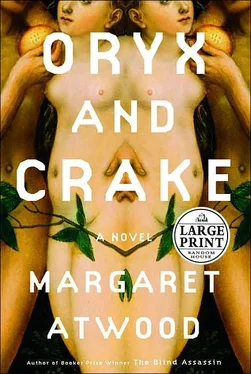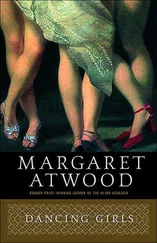“Why aren’t you making the locks for the doors any more?” said Jimmy.
“Because I wanted to stay home with you,” she said, looking over the top of Jimmy’s head and puffing on her cigarette.
“What about the pigoons?” said Jimmy, alarmed. “The microbes will get into them!” He didn’t want his animal pals to burst open like the infected cells.
“Other people are in charge of that now,” said his mother. She didn’t seem to care at all. She let Jimmy play with the pictures on her computer, and once he learned how to run the programs, he could play war games with them—cells versus microbes. She said it was all right if he lost stuff off the computer, because all that material was out of date anyway. Though on some days—days when she appeared brisk and purposeful, and aimed, and steady—she would want to fool around on the computer herself. He liked it when she did that—when she seemed to be enjoying herself. She was friendly then, too. She was like a real mother and he was like a real child. But those moods of hers didn’t last long.
When had she stopped working at the lab? When Jimmy started at the OrganInc School full-time, in the first grade. Which didn’t make sense, because if she’d wanted to stay home with Jimmy, why had she started doing that when Jimmy stopped being at home? Jimmy could never figure out the reasons, and when he’d first heard this explanation he’d been too young to even think about them. All he’d known was that Dolores, the live-in from the Philippines, had been sent away, and he’d missed her a lot. She’d called him Jim-Jim and had smiled and laughed and cooked his egg just the way he liked it, and had sung songs and indulged him. But Dolores had to go, because now Jimmy’s real mummy would be there all the time—this was held out to him like a treat—and nobody needed two mummies, did they?
Oh yes they did, thinks Snowman. Oh yes, they really did.
Snowman has a clear image of his mother—of Jimmy’s mother—sitting at the kitchen table, still in her bathrobe when he came home from school for his lunch. She would have a cup of coffee in front of her, untouched; she would be looking out the window and smoking. The bathrobe was magenta, a colour that still makes him anxious whenever he sees it. As a rule there would be no lunch ready for him and he would have to make it himself, his mother’s only participation being to issue directions in a flat voice. (“The milk’s in the fridge. To the right. No, the right . Don’t you know which is your right hand?”) She sounded so tired; maybe she was tired of him. Or maybe she was sick.
“Are you infected?” he asked her one day.
“What do you mean, Jimmy?”
“Like the cells.”
“Oh. I see. No, I’m not,” she said. Then, after a moment, “Maybe I am.” But when his face crumpled, she took it back.
More than anything, Jimmy had wanted to make her laugh—to make her happy, as he seemed to remember her being once. He would tell her funny things that had happened at school, or things he tried to make funny, or things he simply invented. (“Carrie Johnston went poo on the floor.”) He would caper around the room, crossing his eyes and cheeping like a monkey, a trick that worked with several of the little girls in his class and almost all of the boys. He would put peanut butter on his nose and try to lick it off with his tongue. Most of the time these activities just irritated his mother: “That is not amusing, that is disgusting.” “Stop it, Jimmy, you’re giving me a headache.” But then he might get a smile out of her, or more. He never knew what would work.
Once in a while there would be a real lunch waiting for him, a lunch that was so arranged and extravagant it frightened him, for what was the occasion? Place setting, paper napkin— coloured paper napkin, like parties—the sandwich peanut butter and jelly, his preferred combo; only it would be open-face and round, a peanut butter head with a jelly smile-face. His mother would be carefully dressed, her lipstick smile an echo of the jelly smile on the sandwich, and she would be all sparkling attention, for him and his silly stories, looking at him directly, her eyes bluer than blue. What she reminded him of at such times was a porcelain sink: clean, shining, hard.
He knew he was expected to appreciate all the effort she had put into this lunch, and so he too made an effort. “Oh boy, my favourite!” he would say, rolling his eyes, rubbing his stomach in a caricature of hunger, overdoing it. But he’d get what he wanted, because then she would laugh.
As he grew older and more devious, he found that on the days when he couldn’t grab some approval, he could at least get a reaction. Anything was better than the flat voice, the blank eyes, the tired staring out of the window.
“Can I have a cat?” he would begin.
“No, Jimmy, you cannot have a cat. We’ve been over this before. Cats might carry diseases that would be bad for the pigoons.”
“But you don’t care.” This in a sly voice.
A sigh, a puff of smoke. “Other people care.”
“Can I have a dog then?”
“No. No dogs either. Can’t you find something to do in your room?”
“Can I have a parrot?”
“No. Now stop it.” She wouldn’t really be listening.
“Can I have nothing?”
“No.”
“Oh good,” he would crow. “I can’t have nothing! So I get to have something! What do I get to have?”
“Jimmy, sometimes you are a pain in the ass, do you know that?”
“Can I have a baby sister?”
“No!”
“A baby brother then? Please?”
“No means no! Didn’t you hear me? I said no!”
“Why not?”
That was the key, that would do it. She might start crying and jump up and run out of the room, banging the door behind her, whuff. Or else she might start crying and hugging him. Or she might throw the coffee cup across the room and start yelling, “It’s all shit, it’s total shit, it’s hopeless!” She might even slap him, and then cry and hug him. It could be any combination of those things.
Or it would just be the crying, with her head down on her arms. She would shake all over, gasp for breath, choking and sobbing. He wouldn’t know what to do then. He loved her so much when he made her unhappy, or else when she made him unhappy: at these moments he scarcely knew which was which. He would pat her, standing well back as with strange dogs, stretching out his hand, saying, “I’m sorry, I’m sorry.” And he was sorry, but there was more to it: he was also gloating, congratulating himself, because he’d managed to create such an effect.
He was frightened, as well. There was always that knife-edge: had he gone too far? And if he had, what came next?
Noon is the worst, with its glare and humidity. At about eleven o’clock Snowman retreats back into the forest, out of sight of the sea altogether, because the evil rays bounce off the water and get at him even if he’s protected from the sky, and then he reddens and blisters. What he could really use is a tube of heavy-duty sunblock, supposing he could ever find one.
In the first week, when he’d had more energy, he’d made himself a lean-to, using fallen branches and a roll of duct tape and a plastic tarp he’d found in the trunk of a smashed-up car. At that time he’d had a knife, but he lost it a week later, or was it two weeks? He must keep better track of such things as weeks. The knife was one of those pocket items with two blades, an awl, a tiny saw, a nail file, and a corkscrew. Also a little pair of scissors, which he’d used to cut his toenails and the duct tape as well. He regrets the loss of the scissors.
He was given a knife like that for his ninth birthday, by his father. His father was always giving him tools, trying to make him more practical. In his father’s opinion Jimmy couldn’t screw in a light bulb. So who wants to screw in a light bulb? says the voice in Snowman’s head, a stand-up comic this time. I’d rather do it in bed.
Читать дальше












